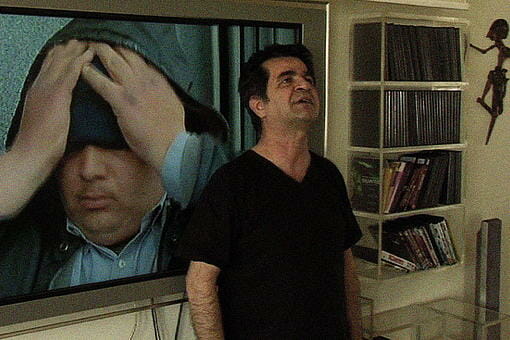By Ryan Mason · November 5, 2011

It’s hard to review This Is Not A Film, because while this most certainly is a film, it also kind of isn’t. At least not in the traditional sense of plot, structure, and character development. It’s above what most people could accomplish when it comes to making a home movie, yet that’s exactly what this is. Just one done by an extremely talented filmmaker.
Iranian writer/director Jafar Panahi submitted his latest screenplay to the Ministry of Cinema only to have it denied, meaning that it was illegal for him to make the film. Since his previous two scripts had also been denied, he decided to just go forward and film it anyway since it was written to take place all inside a house. Partway through production, Iranian officials burst into his home and confiscated all of the footage and equipment, and threw Panahi in jail. This Is Not A Film starts up with Panahi back at home, awaiting the news regarding his appeals case, in which he challenged the sentence handed down to him of 6 years in prison and a 20-year ban from filmmaking, writing screenplays, and even leaving the country. (The conversation with his lawyer is maddening, in which she admits that whatever the judges decide will have nothing to do with legal precedent and will instead be 100 percent based on political influence.)
After the screening, I heard some people directly behind me say that they fell asleep. I couldn’t have had a more different experience, finding myself thoroughly engrossed by such a basic visual tale of a filmmaker attempting to read through the screenplay of his unfinished film while his friend aims a high-end prosumer camera at him. And by the time it felt like This Is Not A Film truly hit its stride, the film ends, leaving us filled with so many more questions and concerns than we had before. Perhaps it’s my own interest in world politics that kept me intrigued rather than what actually happened on the screen, but that’s precisely why this film works even though it’s not quite a film in the way that we’re used to thinking of cinema. Here’s a man who makes movies for a living and yet finds himself facing years in prison and banned from leaving the country or even making more movies for the next twenty years all for doing what he loves to do, and he’s making yet another movie to voice his outrage at his situation. It’s impossible not to root for him.
Panahi’s passion oozes off the screen. We instantly like him as he chats on the phone while putting jelly on some pastry, and how his family calls him on the phone while he’s in the bathroom, and he listens to their long message on the machine. There are also those little personal moments when he asks the cameraman to cut, but he doesn’t cut and he gets mock-upset about it. On top of the wonder if we’ll find out whether or not he’ll have his prison sentence reduced, we’re also nervous about his family and friends because on the day this entire film takes place, it happens to be Fireworks Wednesday, a celebratory event that started during the Green Revolution the year before. And then of course, there’s this constantly looming threat that every time the doorbell rings or there’s a sound outside the door, Iranian officials will burst in and see him with his camera and that will be the true end.
The saying goes that the pen is mightier than the sword. While it doesn’t seem like Panahi’s latest use of art over violence will keep him out of unfair incarceration, if we can at least expand our own worldview to do our part to protect artists and their freedoms, then it won’t be for nothing. This Is Not A Film won’t be something that you find yourself clamoring to watch over and over again, but it’s a powerful cinematic reminder of how movies can be more than just entertainment. They can be political statements. They can be art.